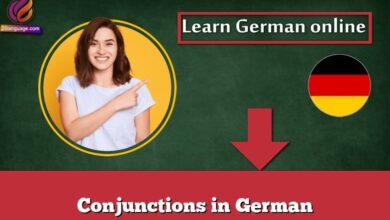Difference between Simple Future and the Future Perfect in German

Difference between Simple Future and the Future Perfect in German.Among these tenses, the Simple Future and the Future Perfect often stand out when expressing forthcoming events. While at first glance they might appear similar, they carry distinct nuances and are used in different contexts.
 Explanation about Difference between Simple Future and the Future Perfect in German
Explanation about Difference between Simple Future and the Future Perfect in German
- Futur I (Simple Future) in German:
- Usage: This tense is used to talk about future events or to express assumptions about the present.
- Formation: It is formed using the auxiliary verb “werden” in the present tense + the infinitive of the main verb.
- Example: “Er wird morgen ankommen.” (He will arrive tomorrow.)
- Futur II (Future Perfect) in German:
- Usage: This tense expresses an assumption that something has already been completed in the future. In essence, it’s used to talk about future actions that will have been completed by a certain point in the future.
- Formation: It’s formed using the auxiliary verb “werden” in the present tense + the past participle of the main verb + the infinitive “haben” or “sein” (depending on the main verb’s auxiliary verb in the perfect tense).
- Example: “Er wird morgen um diese Zeit schon angekommen sein.” (By this time tomorrow, he will have already arrived.)
Differences:
- Time Reference: The Simple Future (Futur I) refers to a simple action in the future. In contrast, the Future Perfect (Futur II) references an action that will be completed by a specific time in the future.
- Complexity: Futur I is more straightforward and is used more often in everyday speech. Futur II, on the other hand, is less commonly used in daily conversation, as it describes a more complex temporal relationship.
Examples about Difference between Simple Future and the Future Perfect in German
| Aspect | Tense | Example German Sentence | English Translation |
|---|---|---|---|
| Action in the future | Simple Future (Futur I) | Er wird lesen. | He will read. |
| Assumption about the present | Simple Future (Futur I) | Er wird jetzt zu Hause sein. | He will be at home now. (He is probably at home now.) |
| Action completed by a specific time in the future | Future Perfect (Futur II) | Er wird das Buch gelesen haben. | He will have read the book. |
| Assumption that an action has been completed in the past | Future Perfect (Futur II) | Er wird das Buch gestern gelesen haben. | He will have read the book yesterday. (He probably read the book yesterday.) |
In conclusion, understanding tenses in language greatly aids in effective communication and precise writing. The Simple Future and Future Perfect, while both pointing to future events, each have their unique usages and nuances. By distinguishing between these two tenses, a learner or speaker can enhance their ability to articulate events and times with accuracy and clarity.





























